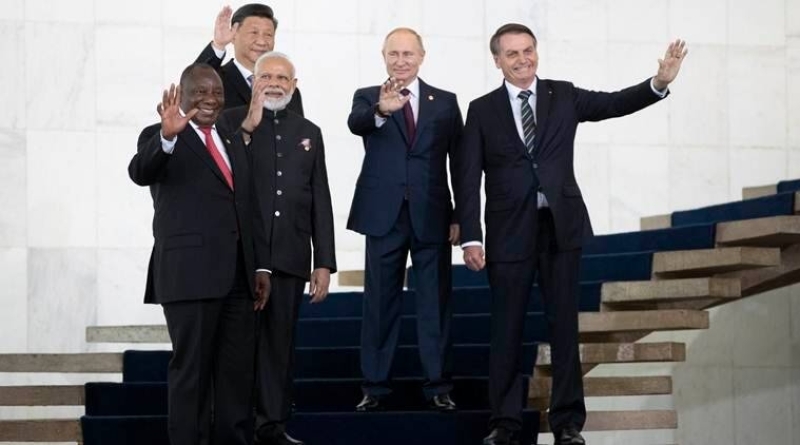BRICS the new global power center
The BRICS association - until recently known as a "discussion club" for the emerging economies of Brazil, Russia, India, China and South Africa - is in the process of developing into a major player in world politics. Can their progressive political and economic integration form the heart of a fairer world order?
During its existence, the BRICS community of five emerging economies, Brazil, Russia, India, China and South Africa, has achieved a very high level of cooperation and has gained enormous weight in the world economy and politics. Recently, the possible expansion of the group of countries has also become the focus of attention and remains more relevant than ever, as the BRICS partnership offers a great opportunity for many countries in the midst of today's turbulent times.
This is all the more true in times of economic restrictions and other sanctions that the world hegemon USA and its allies regularly enact against countries with which they do not agree. US dominance of the global financial system has left these countries with few options, but the situation is changing thanks to the BRICS and other multilateral organizations that offer the means to circumvent such sanctions.
BRICS cooperation as a geopolitical alternative
More and more countries are taking advantage of this opportunity and relying on pragmatic cooperation with the BRICS, including within the framework of "BRICS Plus" - a specially developed format that enables other countries to take part in certain BRICS events. This year alone, Egypt, Indonesia, Kazakhstan, Nigeria, the United Arab Emirates, Saudi Arabia, Senegal and Thailand have taken part in a BRICS Plus conference.
However, many do not want to stop at cooperation alone. In addition to some of the states already mentioned, Turkey, Argentina, Iran, Mexico and Tajikistan are said to have expressed their interest in joining the BRICS. However, despite the advocacy of five members, few practical steps have been taken in this direction.
The question of BRICS expansion was then discussed intensively in the run-up to and during this year's BRICS summit, and received an immense media boost a few days after the meeting, when the Islamic Republic of Iran and Argentina first submitted their applications for membership and it was then reported that that Egypt, Saudi Arabia and Turkey are traded as potential accession candidates.
This development can be seen as evidence that the BRICS – as the countervailing power of the collective West – want to realize a new, more just and multipolar world order, primarily through their expansion. The bloc of states could change today's US-dominated order by creating a broad base for an alternative center of power with new members and with their help expanding the new framework conditions to other parts of the world.
candidate countries Iran and Argentina
In this sense, Iran's desire for membership was not exactly surprising, even if the application for membership undoubtedly came as a surprise to many observers. Iran, which has been particularly hard hit by US sanctions in the past, was not necessarily seen as a prime candidate for joining the BRICS, but was nonetheless always viewed as a trusted partner of the community.
The Iranian side expressed its belief that the BRICS have played "a crucial role" in "practicing genuine multilateralism and promoting the unity and strength of developing countries". That is why Tehran is ready to offer all "resources and benefits, including energy reserves, human resources and scientific achievements" to help the BRICS countries achieve their goals.
In this context, Iranian President Ebrahim Raisi has assured that his country's "geopolitical and geoeconomic situation" could make it a "stable and reliable partner" for the BRICS. They are also prepared to give the BRICS countries the opportunity to open up new markets and cover their energy needs with Iran's help.
And Argentina is also keen to make it clear to the critics that it can be "a full member of this group". President Alberto Fernández stressed that his country could make an important contribution to BRICS economic cooperation, since Argentina is, among other things, a safe and responsible food supplier and recognized in the field of biotechnology and applied logistics technology.
In return, it should be noted that the BRICS represent an opportunity for the crisis-ridden South American country – Argentina has been in an economic crisis for years and is struggling with high national debt – to improve its economic situation. However, experts have pointed out that Buenos Aires is very closely linked to China and is very dependent on the People's Republic in various areas, which is why the Argentines are a preferred candidate for Beijing in particular.
candidate countries Egypt and Turkey
In addition to Iran and Argentina, three other top candidates could join the BRICS: Egypt, Saudi Arabia and Turkey. According to the President of the International BRICS Forum, Purnima Anand, the group of states discussed this issue during the past summit. She therefore expects the three countries to apply soon. "All these countries have expressed their interest in joining and are preparing to apply for membership. I think this is a good step because enlargement is always perceived positively, which shows the influence of the BRICS in the world increase," explained Anand.
The accession of emerging developing countries like Egypt could well strengthen BRICS economic cooperation and help the group play a more prominent role in international politics.
This also applies to Turkey, since the country is one of the most important regional powers in the Black and Mediterranean regions and in the Caucasus and at the same time acts as the western gateway to Central Asia. Ankara is also in the process of expanding its cooperation with Moscow and Tehran towards a strategic partnership.
However, Turkey's admission to the BRICS is also problematic, since the country is one of the most important NATO members and its actions alongside China and Russia are likely to meet with US opposition. While the BRICS are not a military alliance and do not identify NATO as their geopolitical adversary, the group ultimately aims to build a new center of power that will be directed against US interests.
Saudi Arabia - the big surprise?
According to experts, the admission of Saudi Arabia, the regional power in the Middle East, could have major consequences for the geopolitical balance of the world. The Kingdom is the world's largest oil exporter and as such already exerts significant influence on global oil policy and energy markets. Together with Russia, the largest gas exporter, the Saudis could also influence the global supply of these two most important commodities even more.
Apparently, the OPEC heavyweight wants to achieve just that, as it has apparently distanced itself from the US and instead coordinated its oil production with Russia. Regarding Moscow, Riyadh has also been increasingly uncooperative with Washington's policies, acting as an independent actor, for example by refusing to participate in anti-Russian sanctions or the West's "oil war" against Russia.
However, various geopolitical challenges and other difficulties remain in the expansion to include Saudi Arabia and Iran. One of them would be the political rapprochement and willingness to cooperate between the two rival Islamic systems, Sunni Riyadh and Shia Tehran, which are also fighting over regional hegemony in the Persian Gulf.
However, a rapprochement between the two countries under the umbrella of the BRICS, which offer enough space for different views and their respective problems with US dominance, is not impossible. Especially since the two players could be strategic partners due to their oil and gas reserves, which would be an advantage given the crisis in the global energy sector.
It is not yet possible to say which of the states mentioned will join the group at the end of the day, and it remains to be seen when South Africa will chair next year. What can be stated, however, is the fact that the BRICS are binding more and more countries to themselves. It can therefore already be assumed that other countries will apply for BRICS membership in the future.

Comments to this:








